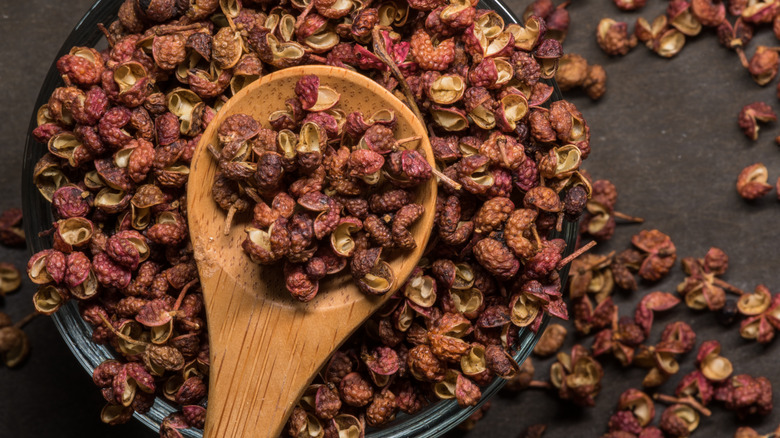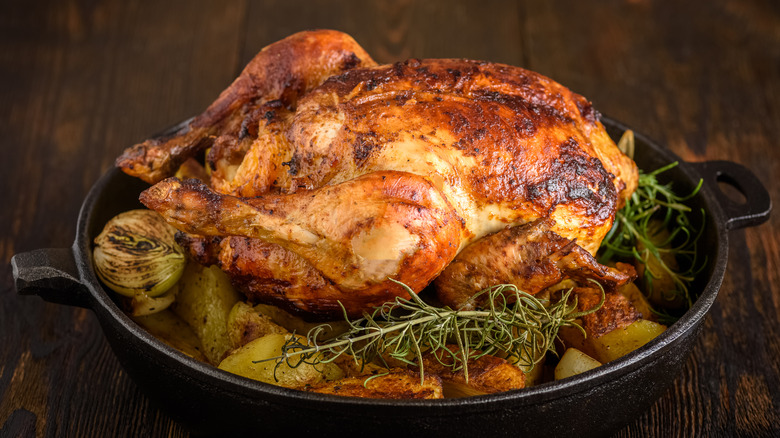The Flavorful Pepper Gordon Ramsay Uses To Season Roast Chicken
When seeking invaluable cooking tips, many home cooks look to celebrity chef, restauranteur, and television superstar Gordon Ramsay. Some of Ramsay's sage cooking advice includes cutting bell peppers facing downward on a cutting board while steering clear of the seeds for clean slender slices; ripening your fruit super fast by placing the fruit and a banana in a brown paper bag stored in a dim area; and covering your fingertips with fresh lemon juice to rid them of peppery stings. Here's another cooking tip you may want to use from Ramsay. When it comes to his signature roast chicken, he uses a very distinctive spice to season his bird.
As Ramsay demonstrated on TikTok, while he coats his chicken in egg as he prepares to roast it, he also sprinkles the raw meat with Szechuan pepper (also known as Sichuan pepper). This ancient Chinese spice has a slightly fruity taste, and when the pepper enters your mouth, it creates a prickly, desensitizing feeling on your tongue. Author Harold McGee writes (via Red House Spice) that Szechuan peppers "produce a strange, tingling, buzzing, numbing sensation that is something like the effect of carbonated drinks or of a mild electric current." This unique pepper that essentially zaps your mouth is fascinating.
Szechuan roast chicken has distinctive flavor
When you season a whole chicken with Szechuan peppercorns and roast it, you will be treated to a soft, succulent chicken with a crunchy outer layer that will arouse your taste buds. To give your Szechuan roast chicken an even more complex flavor profile, and maybe even take advantage of the pepper's spice-numbing effects, you can whip up a fiery marinade and rub it all over your raw whole chicken before roasting it so it comes out of the oven packed with layers of your favorite spicy flavors. You might be able to comfortably enjoy your spicy roast chicken without constantly searching for relief from the heat.
Interestingly enough, although it is referred to as a pepper, Szechuan actually isn't a pepper at all. Szechuan pepper, or peppercorns, are actually dried berries that come off a barbed tree found in China's Sichuan province. When you eat these "peppers," you'll find that they actually don't have a spicy flavor at all. If you're eating something seasoned with Szechuan pepper and your food tastes spicy, it's likely because the spice has been combined with chili peppers.
How Szechuan pepper works
The electricity that fills your mouth when a Szechuan pepper hits your tongue is explained by the particle that the pepper contains, hydroxy-alpha-sanshool, which connects to the cell receptors in your mouth. This gives you the sensation that something is hitting your tongue and cheeks. That molecule simultaneously, and astoundingly, prevents those same cell receptors from being impacted by the spicy heat of the chili peppers' capsaicin, an element found in spicy food. When chili spice and Szechuan spice are blended into your food, the desensitization of the Sichuan spice allows you to enjoy the intense taste and scent of the chili without feeling the chili's profuse burn and heat, which is why Szechuan is often paired with hotter spices.
Now that you know all about Ramsay's sneaky good pepper seasoning for his roast chicken, surprise your guests with a Szechuan roasted chicken at your next soirée. Keep an eye on that person who has always been just a little afraid of spicy food, and see if they thank you for providing a way for them to finally enjoy the spicier side of eating. Indeed, Szechuan pepper is incredibly unique and it's clear why it's gained traction among chefs.


